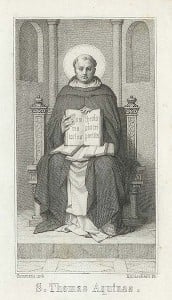 We’re blogging through St. Thomas Aquinas’ Compendium Theologiae, sometimes called his Shorter Summa. Find the previous posts here.
We’re blogging through St. Thomas Aquinas’ Compendium Theologiae, sometimes called his Shorter Summa. Find the previous posts here.
When Thomas considers a proposition in his magisterial Summa Theologiae, he does so in the form of a debate. First he states the proposition in the form of a question. Then he gives a list of objections: brief arguments as to why the answer to the question is “No!” He makes it a point to be fair; he lists all of the serious objections he’s aware of or can come up with himself. Next, he explains why the answer is, in fact, “Yes!”, based on the testimony of revelation and reasoned argument. And then, finally, he rebuts all of the objections.
He doesn’t usually go into this kind of detail in the Compendium Theologiae, but in this chapter he can’t quite help himself. There are two obvious objections that he feels he must deal with to do justice to the topic.
First, how can God be three if God is one?
A certain contradiction, arising from truths previously established, seemingly makes its appearance at this point. If threefold personality is assumed in God, then, since number always follows division, some division will have to be acknowledged in God, whereby the three may be distinguished from one another. Thus supreme simplicity will be lacking in God. If three agree in some respect and differ in another, composition must be present; which is contrary to what was set forth above.
Now note that it’s actually quite easy for a thing to be three and one at the same time; it just has to be three in one way and one in another way. “You and me and baby makes three,” as the saying goes: one family, but three persons. But that implies composition: the one family is composed of three distinct and separate persons. And in general, that’s how you get numbers of things, by dividing them up into separate pieces.
But God is supposed to be metaphysical simple, having no separable parts; how can God be three yet have no separable parts?
Second, things do not originate from themselves. A man isn’t conceived of himself; he’s conceived by his mother and father. An apple tree doesn’t make itself spring into being; it grows from a seed that came from another tree. Yet the Son and the Holy Spirit are said to originate from the Father, that is, from another. This also seems to imply a radical separation. How can they be one?
Again, if God must be strictly one, as was shown above, and if one and the same thing cannot originate or proceed from itself, it seems impossible for God to be begotten or to proceed.
Given these objects, then, it seems that the notion of the Trinity must be wrong-headed:
Wrongly, therefore, the names of Father and of Son and of proceeding Spirit are given place in the Godhead.
Thomas disagrees, naturally, but it will take him the next five chapters of the Compendium to explain why, even in cursory detail. And two of those five chapters are the longest we’ve seen yet. Pull up your socks, it’s going to be a long walk.
____
photo credit: Public Domain; source Wikimedia Commons









